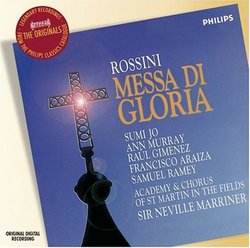Marriner's bebop version returns to currency
Larry VanDeSande | Mason, Michigan United States | 11/11/2007
(3 out of 5 stars)
"Rossini's Messa di Gloria qualifies as a masterwork long unavailable to lovers of sacred music and fine singing. Rossini composed the gloria mass aoubt 1820 in the traditional form. The Gloria section makes up about half the score and is divided into operatic sections where soprano soloists alternating with each other, two tenors, and a bass. The pinnacle is the qui tollis that concludes with a demonstration of the extreme tenor tessitura. A bass solo quoniam and blazing choral cum sancto close the piece afterward.
This wonderful music was premiered in April 1820, then ignored for a century and a half until British tenor and conductor Herbert Handt discovered the score in the 1970s and recorded it for Philips wiht a better group of singers than Marriner. Handt's recording created a sensation no other recording has been able to match, in part because of the fabulous performance of tenor Ugo Benelli in the qui tollis, a feat no tenor on any intervening recording has matched.
Unfortunately, Handt's 1976 recording has been out of print for a long time and locating a CD version today -- it made an appearance in the early 1990s and disappeared almost immediately -- would be like finding a needle in a grain pile. You have a better chance of locating the LP version (Philips 6500 612) that still shows up occasionally on ebay and through various dealers. Among its virtues are natural sound and very helpful notes.
It's been said that Rossini's sacred music is too frivolous to be religious. That is confirmed in this recording, where Marriner's superficial leadership projects a fun time with no particular point of view. He vests little weight in sacred text and tends to bop around in the score like Mitch Miller used to when leading the television public in "Sing Along With Mitch". If you are too young to know Mitch Miller, google him or ask your parents or grandparents about him.
While direction is deficient, Marriner should have been aided by a starry singing quartet -- Samuel Ramey, Sumi Jo, Francisco Araiza and Raul Gimenez in the principal solo roles -- and delightful playing by the erstwhile Academy of St. Martin-in-the-Fields. Yet not one of these partners turns in a top notch rendering in a performance I would say lacks commitment and understanding. To consider this performance Italianate is to think Herbert von Karajan Italian.
Marriner's version first came to currency in the 1990s when it was the only rendition available aside from the equally mundane performance led by violinist-turned-conductor Salvatore Accardo. Niether one fulfilled the requirements of the score, which call for equal amounts of the composer's winged joy mated to a quantity of religious conviction. The gap was not closed when Wilhelm Keitel's Arte Nova recording arrived with a no name cast in 2000. Keitel's singers tried their best and his recording was the best ever for this music but the whole thing was too earthbound and Germanic for this fiery Italian score.
Last year, Hanssler Classics released a 1998 concert performance led by Handt that, mysteriously, never showed up previously in USA. This version comes closest to matching the magic from Handt's Philips issue. While the audience goes wild at the end of a fine performance, a poor recording balance brings the soloists up close, casts the orchestra in a distance, and makes the audience sound a mile away works against the overall concept.
On balance, however, Handt's 1976 concept is re-enacted. As Handt said in his notes to the original Philips issue: "One cannot judge Italian Catholic music with German Potestant criteria and expect to understand and appreciate it. Rossini stayed as near the spirit and letter of the word as Bach did, and perhaps closer than many other composers who are better known for their religious music."
The single advantage of the Marriner reissue is its low cost. Anoyone coming to this music for the first time can acquire his version new for less than $10. The sound is a little better this time than before, also. This diminishes the shortcomings of the performance to some extent. If you hear this and want to know what the music can become when better realized, spend the extra to hear the Handt 1998 recording. Better yet, do an Internet search and see if you can locate the Handt Philips recording, which still sound better today than Marriner's CD.
"


 Track Listings (12) - Disc #1
Track Listings (12) - Disc #1